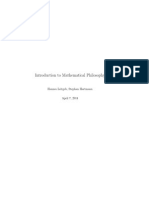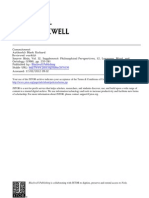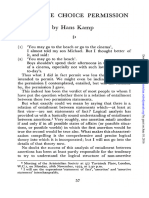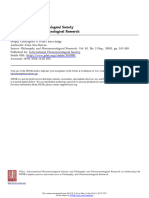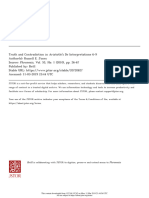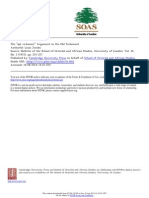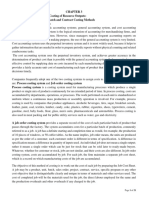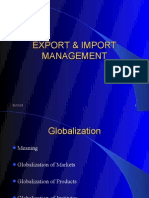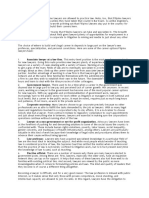McGee - Counterexample To Modus Ponens
McGee - Counterexample To Modus Ponens
Uploaded by
Eric_CrowCopyright:
Available Formats
McGee - Counterexample To Modus Ponens
McGee - Counterexample To Modus Ponens
Uploaded by
Eric_CrowOriginal Title
Copyright
Available Formats
Share this document
Did you find this document useful?
Is this content inappropriate?
Copyright:
Available Formats
McGee - Counterexample To Modus Ponens
McGee - Counterexample To Modus Ponens
Uploaded by
Eric_CrowCopyright:
Available Formats
A Counterexample to Modus Ponens
Author(s): Vann McGee
Source: The Journal of Philosophy , Sep., 1985, Vol. 82, No. 9 (Sep., 1985), pp. 462-471
Published by: Journal of Philosophy, Inc.
Stable URL: http://www.jstor.com/stable/2026276
JSTOR is a not-for-profit service that helps scholars, researchers, and students discover, use, and build upon a wide
range of content in a trusted digital archive. We use information technology and tools to increase productivity and
facilitate new forms of scholarship. For more information about JSTOR, please contact support@jstor.org.
Your use of the JSTOR archive indicates your acceptance of the Terms & Conditions of Use, available at
https://about.jstor.org/terms
is collaborating with JSTOR to digitize, preserve and extend access to The Journal of
Philosophy
This content downloaded from
62.204.213.86 on Tue, 28 Jul 2020 18:15:08 UTC
All use subject to https://about.jstor.org/terms
This content downloaded from
62.204.213.86 on Tue, 28 Jul 2020 18:15:08 UTC
All use subject to https://about.jstor.org/terms
A COUNTEREXAMPLE TO MODUS PONENS 463
If that creature has lungs, it's a lungfish.
Lungfishes are rare, oddly shaped, and, to my knowledge, appear only
in fresh water. It is more likely that, even though it does not look like
one, the animal in the net is a porpoise.
Having learned that gold and silver were both once mined in his re-
gion, Uncle Otto has dug a mine in his backyard. Unfortunately, it is
virtually certain that he will find neither gold nor silver, and it is en-
tirely certain that he will find nothing else of value. There is ample
reason to believe
If Uncle Otto doesn't find gold, then if he strikes it rich, it will be
by finding silver.
Uncle Otto won't find gold.
Since, however, his chances of finding gold, though slim, are no
slimmer than his chances of finding silver, there is no reason to sup-
pose that
If Uncle Otto strikes it rich, it will be by finding silver.
These examples show that modus ponens is not an entirely reliable
rule of inference. Sometimes the conclusion of an application of
modus ponens is something we do not believe and should not be-
lieve, even though the premises are propositions we believe very
properly.3
Modus ponens is sometimes thought of not as a rule of inference
but as a law of semantics, to wit, whenever rIf 0 then q,1 and X a
both true, X is true as well. It is not at all obvious what we are to
make of this law, since it is not evident what the truth conditions
for the English conditional are or even whether it has truth condi-
tions. Still it seems unlikely that, even if we learned the truth con-
ditions for the English conditional, the semantic version of modus
ponens would be vindicated. Let us imagine, on the contrary, that
some time in the future linguists will determine the truth condi-
tions for the English conditional and prove that modus ponens is
truth-preserving. Assuming that basic zoology will not have
changed, a future linguist who sees what looks like a large fish
writhing in a fisherman's net a ways off will believe, as I believed,
If that animal is a fish, then if it has lungs it's a lungfish.
That animal is a fish.
Suppose he also believes this:
It is true that, if that animal is a fish, then if it has lungs it's a lungfish.
It is true that that animal is a fish.
3There are, of course, familiar cases in which we see that an application of modus
ponens leads us from premises we reasonably believe to a conclusion we find utterly
incredible, and we respond by repudiating the premises rather than accepting the
conclusion. The present examples are not like this, since we do not renounce the
premises.
This content downloaded from
62.204.213.86 on Tue, 28 Jul 2020 18:15:08 UTC
All use subject to https://about.jstor.org/terms
464 THE JOURNAL OF PHILOSOPHY
Then he will be able to prove, using the well-established principle
of future semantics that modus ponens is truth-preserving:
It is true that, if that animal has lungs, it is a lungfish.
He will not, however, believe
If that animal has lungs, it is a lungfish.
any more than I did. Thus our future linguist will be either in the
awkward position of believing the premises of the argument with-
out believing that those premises are true, or else in the equally
awkward position of not believing the conclusion of the argument
even though he does believe that that conclusion is true. Thus the
only way that we can hold on to the doctrine that modus ponens is
truth-preserving will be to accept an unexpected disparity between
believing a proposition and believing that that proposition is true.
In an attempt to supply truth conditions where nature provides
none, philosophers have settled upon material implication: Count
rIf 4 then qifl as true if either 4 is false or q, is true. Sometimes t
is intended as a proposal for linguistic reform, a suggestion that, at
least in our scientific discourse, we ought to use the "If-then" con-
struction in a new way, treating it as the material conditional
rather than the ordinary conditional. Our examples do not raise
any difficulties for this proposal, since if we reinterpret them this
way, our examples become arguments with true premises and true
conclusions. Sometimes, however, material implication is proposed
as an account of how we presently use the "If-then" construction.
This is surely wrong. If we have seen the polls showing Reagan far
ahead of Carter, who is far ahead of Anderson, we will not for a
moment suppose that
If Reagan doesn't win, Anderson will.
is true, even though we will resign ourselves to the truth of
Reagan will win.
Our counterexamples to modus ponens have a characteristic log-
ical form. Each has as a premise a conditional whose consequent is
itself a conditional. In general, we assert, accept, or believe a condi-
tional of the form rIf 4, then if tf then 41 whenever we are willing
4The first horn of this dilemma would not be uncomfortable to someone like
Adams [The Logic of Condztionals (Boston: Reidel, 1975)] who doubts that condi-
tionals are either true or false. By hypothesis, this is not the situation of our future
linguist.
This content downloaded from
62.204.213.86 on Tue, 28 Jul 2020 18:15:08 UTC
All use subject to https://about.jstor.org/terms
A COUNTEREXAMPLE TO MODUS PONENS 465
to assert, accept, or believe the conditional rIf X and if, then 01. It
appears, from looking at examples, that the law of exportation.
FIf 0 and /, then 01 entails rFf X, then if i/ then 01.
is a feature of English usage.5 If so, then our counterexamples to
modus ponens are not isolated curiosities but rather symptoms of a
basic difficulty. It is natural to suppose that the English indicative
conditional is intermediate in strength between strict implication
and material implication. That is to say, whenever fr is a logical con-
sequence of X, rIf 4 then t#h1 will be true, and whenever rIf 4 then 0/1
is true, either 4 will be false or d/ true (and so modus ponens is truth-
preserving). It now appears that we also want to require that the law
of exportation be valid. But there is no connective other than the
material conditional that meets all these requirements.
Theorem. Suppose that we have a logical consequence relation p on a
language whose connectives comprise the ordinary Boolean connec-
tives 'v', '&, '-', 'D', and '-', as well as an additional conditional
' D ', satisfying the following conditions:
(Cons) F, a relation between sets of sentences and sentences, is a
consequence relation:
If ? & F, then F F 0.
If F F X and F C A, then A F k.
If A F i for each , G I` and F F I , then A F ?.
(Exp) The law of exportation for " p"
trf & q' 01} [r.Fo = (i/i O 0)1
(MP) Modus ponens for both conditionals " '> and "D":
11ro D qJ1, o} F qf
(Strlmp) Strict implication is as strong or stronger than either condi-
tional: If lo)} F , then 4)m r > 1 and 4 F r-D
(where 4) is the empty set).
(Taut) Ordinary Boolean connectives behave normally: If ? is a
tautology,6 then 4) F .7
Then the two conditionals " # " and "D" are logically indistinguisha-
ble. More precisely, if 0 and O' are alike except that' e' and 'D' have
been exchanged at some places, then {/l} F t' and {O'} F 0.
'It would appear that the law of importation, the converse of the law of exporta-
tion, is also valid.
6To see whether k is a tautology, apply the following test: First replace every sub-
formula of p of the form r i/ a> 01 that is not itself contained in such a subformula
by a new sentential letter. Then apply the usual truth-table test.
'We get an equivalent set of conditions by replacing (Exp) and (Strlmp) for '4'
by the principle
(Cond) If rP U toF /,, then F pro a *1
This rule reflects the way we customarily prove conditionals: Add k hypothetically
to our body of theory. If we can prove fr in the augmented theory, count rIf ; then
)I,1 as proved.
This content downloaded from
62.204.213.86 on Tue, 28 Jul 2020 18:15:08 UTC
All use subject to https://about.jstor.org/terms
466 THE JOURNAL OF PHILOSOPHY
The idea of the proof, which proceeds by induction on the com-
plexity of X, is contained in the proof that { Dfr D 61} [ r > 0-1:
(i) DF F((qf D 0) & qf) D 01 by (Taut).
(ii) {F((V, D 0) & qf) D 01; F(V, D 0) & qP1} F- 0 by (MP) for 'D'
(iii) {F(V D 0) & 01/} - 0 from (i) and (ii) by (Cons)
(iv) 4 FF((O D 0) & 0 # 01 from (iii) by (StrImp) for
(v) IF(( D 0) & ) # 0 1 F r( D 0) ( ( 0)1 by (Exp)
(vi) {F( D 0) # ( 0)1; r D 01 0 r 0 -1 by (MP) for ''
(vii) {frV D 01} F rFV # 01 from (iv), (v), and (vi) by (Cons)
The theorem points to a tension between modus ponens and the
law of exportation. According to the classical account, which does
not recognize any conditional other than the material, both are
valid; but we will not expect them both to come out valid on any
nonclassical account.
We have explicit examples to show that the indicative condi-
tional does not satisfy modus ponens. It is not so easy to test
whether the rule is valid for the subjunctive conditional, since we
seldom use the subjunctive conditional in situations in which we
are confident that the antecedent is true. On the other hand, it is
easy to find natural instances of the law of exportation that employ
the subjunctive mood; for example,
If Juan hadn't married Xochitl and Sylvia hadn't run off to India,
Juan and Sylvia would have become lovers.
entails
If Juan hadn't married Xochitl, then if Sylvia hadn't run off to India,
Juan and Sylvia would have become lovers.
Multiplying such examples, we get good inductive evidence that
the subjunctive conditional satisfies the law of exportation. If this
evidence is correct, then no theory of the subjunctive conditional
which denies the law of exportation will be entirely accurate. The
most prominent logical theory of the subjunctive conditional is
Robert Stalnaker's account,9 according to which we test whether
r-) X> 01 is true in a possible world w by seeing whether X is true i
the possible world most similar to w in which X is true. Stalnaker's
8This conclusion already shows us that ' a ' is not genuinely stronger than the
material conditional, as we would have hoped. Notice that to get it we need only
this very weak form of (Strlmp):
If q1 is a tautological consequence of ?, then b S r- Fa q i1.
9"A Theory of Conditionals," in Nicholas Rescher, ed., Studies in Logical The-
ory. American Phzlosophical Quarterly supplementary monograph series (Oxford:
Blackwell, 1968), pp. 98-1 12.
This content downloaded from
62.204.213.86 on Tue, 28 Jul 2020 18:15:08 UTC
All use subject to https://about.jstor.org/terms
A COUNTEREXAMPLE TO MODUS PONENS 467
system satisfies conditions (Cons), (MP), (Strlmp), and (Taut), but
it does not satisfy the law of exportation. Thus we are led to sus-
pect that Stalnaker's analysis of the subjunctive conditional is
inaccurate.
Concrete examples confirm our suspicions. We would ordinarily
say (at least in contexts in which we are interested in the election
results rather than, say, how else the primaries might have turned
out),
If Reagan hadn't won the election and a Republican had won, it
would have been Anderson.
Appropriately, the Stalnaker semantics, under the natural compari-
tive similarity ordering among worlds, has this sentence come out
true. As the law of exportation predicts, we also want to say,
If Reagan hadn't won the election, then if a Republican had won, it
would have been Anderson.
However, the possible world most similar to the actual world in
which Reagan did not win the election will be a world in which
Carter finished first and Reagan second, with Anderson again a
distant third, and so a world in which "If a Republican had won it
would have been Reagan" is true. Thus Stalnaker's theory wrongly
predicts that, in the actual world,
If Reagan hadn't won the election, then if a Republican had won, it
would have been Reagan.
will be true. Thus, in this instance, the law of exportation is right
and the Stalnaker semantics is wrong.
Another example: Let us imagine that, contrary to all our expec-
tations, Uncle Otto finds a rich vein of gold, deeply buried in a dis-
tant corner of his property. We still believe this:
If Uncle Otto hadn't found gold but he had struck it rich, it would
have been by finding silver.
We also believe, as the law of exportation predicts,
If Uncle Otto hadn't found gold, then if he had struck it rich, it would
have been by finding silver.
What does the Stalnaker semantics say? The closest world to the ac-
tual world in which Uncle Otto does not find gold-call it w-will
be a world in which the deposit of gold is located just on the other
side of Otto's property line, or perhaps a world in which Otto does
not dig quite deeply enough to reach the vein. The world closest to
This content downloaded from
62.204.213.86 on Tue, 28 Jul 2020 18:15:08 UTC
All use subject to https://about.jstor.org/terms
468 THE JOURNAL OF PHILOSOPHY
w in which Otto strikes it rich will be a world in which the gold is
relocated back onto Otto's property and Otto digs deeply enough to
find the gold. Thus the closest world to w in which Uncle Otto
strikes it rich will be a world in which
Uncle Otto finds gold.
is true. Therefore, in w,
If Uncle Otto had struck it rich, it would have been by finding gold
is true, and so, according to Stalnaker's semantics,
If Uncle Otto hadn't found gold, then if he had struck it rich, it would
have been by finding gold.
is true in the actual world. Once again, the law of exportation
scores a point against the Stalnaker semantics.
Our examples show us that an accurate logic for the English in-
dicative conditional would have to restrict the rule of modus ponens
somehow, and they suggest that the same would be true of an accu-
rate logic of the subjunctive conditional. Nevertheless, all the fa-
miliar logics of the conditional countenance modus ponens with-
out reservations. How do we account for this discrepancy? The
simplest diagnosis is that we have committed an error of overly
hasty generalization. We encounter a great many conditionals in
daily life, and we have noticed that, when we accept a conditional
and we accept its antecedent, we are prone to accept the consequent
as well. We have supposed that this pattern held universally, with
no exceptions. However, the examples we looked at were nearly
always examples of simple conditionals, conditionals that did not
themselves contain conditionals. Indeed there is every reason to
suppose that, restricted to such conditionals, modus ponens is un-
exceptionable. But when we turn our attention to compound con-
ditionals, new phenomena appear, and patterns that established
themselves in the simple cases are disrupted.
The methodological moral to be drawn from this is that, when
we formulate general laws of logic, we ought to exercise the same
sort of caution we exercise when we make inductive generalizations
in the empirical sciences. We must take care that the instances we
look at in evaluating a proposed generalization are diverse as well
as numerous.
It is perhaps surprising that, in constructing a logical theory,
one comes upon the same pitfalls one encounters in the empirical
sciences, since it is widely believed that logic is an a priori science.
Upon reflection, however, we see that there is no cause for perplex-
This content downloaded from
62.204.213.86 on Tue, 28 Jul 2020 18:15:08 UTC
All use subject to https://about.jstor.org/terms
A COUNTEREXAMPLE TO MODUS PONENS 469
ity. If one believes that the correctness of a logically valid inference
is recognized by an a priori intuition, what one believes is this:
If a is a valid rule of inference, then whenever R is an instance of X
one can see by an a priori intuition that R is a correct inference.
In order to conclude that the general laws of logic can be estab-
lished purely by a priori reasoning, we would have to know some-
thing stronger, namely,
If a is a valid rule of inference, then one can see by an a priori intui-
tion that, whenever R is an instance of i, R is a correct inference.
Our examples show that modus ponens is not strictly valid.
They do nothing to dissuade us from our entrenched belief that
modus ponens is valid for simple conditionals. They suggest that
the law of exportation is valid for a wide range of cases, perhaps
even valid universally. Beyond this, the examples give us no posi-
tive guidance toward constructing a correct logic of conditionals. It
may be that some entirely new approach is needed, but it may also
be that we can modify some existing theory to take the examples
into account.
It is not hard to modify the Stalnaker semantics so that it has the
right logical features. Instead of the simple notion of truth in a
world, we develop a notion of truth in a world under a set of hypo-
theses. To be simply true in a world is to be true in that world
under the empty set of hypotheses. If there is no world accessible
from w in which all the members of F are true, then every sentence
is true in w under the set of hypotheses F. Otherwise we have the
following: An atomic sentence is true in w under the set of hypo-
theses F iff it is true in the possible world most similar to w in
which all the members of F are true. A conjunction is true in a
world under a given set of hypotheses iff each of its conjuncts is. A
disjunction is true in a world under a set of hypotheses iff one or
both disjuncts are. r- 4V1 is true in w under the set of hypotheses
r iff X is not true in w under that set of hypotheses. Finally,
rX a t1 is true in w under the set of hypotheses F iff tf is true in
w under the set of hypotheses IF U t}. Thus to evaluate whether
r- 4 (i /> 0) )1 is true under the set of hypotheses F, we add first 4
and then t to our set of hypotheses, and we see whether 0 is true
under the augmented set of hypotheses IF U t4k, t#}. This semantics
gives a logic that is compact and decidable.
For each sentence constructed using this modified Stalnaker con-
ditional, we can find a logically equivalent sentence that uses the
original Stalnaker conditional. We use ' a ' to stand for the modi-
This content downloaded from
62.204.213.86 on Tue, 28 Jul 2020 18:15:08 UTC
All use subject to https://about.jstor.org/terms
470 THE JOURNAL OF PHILOSOPHY
fied Stalnaker conditional and '>' to denote the connective Stal-
naker originally described. We take the Boolean connectives to be
v', '&', ' and a logically constant false sentence ' Define the
operation * by:
= 4 if 4 is an atomic sentence.
v rl* = v(?* V
F(g & *= F(*& g fr
F(? 4a ~r)l* = F(?* > )1 if / is an atomic sentence or '1'
r( ( v 0)) 1# =) *(( ? #V (
F(?, 4? ....)l* = r( 1)# v- ((O
0(0 ( f 0))1* = F((0 & ) # 0)
4 and 4)* are logically equivalent.
Another approach we might use would be to continue to use a
formal system in which modus ponens has unrestricted validity,
and to take account of the invalidity of modus ponens in English
by modifying our informal rules for translating English sentences
into the formal language.'0 Thus we do not translate an English
sentence of the form rIf 4, then if t# then 01 in the natural way, as
a formula of the form F(4 a~ (t4 a~ 0))1; instead we translate it as
F((4 & t#) , 0))1. Thus the invalid English inference:
If X, then if J then 0.
Therefore if 0 then 0.
is translated as the invalid formal inference:
Therefore f 4 6.
It is sometimes a bit arbitrary whether to account for a feature of
English usage within our formal system or to account for it at the
informal level of translation lore. For example, we just discussed a
way of modifying the Stalnaker conditional so as to make the law
of exportation generally valid. If we let Tr(4) be the "natural"
translation of an English sentence X into a formal language whose
connectives are the Boolean connectives and ' X ', we can equally
well take the translation of X to be Tr(4) and use the modified
'?Barry Loewer, "Counterfactuals with Disjunctive Antecedents," this JOITRNAI,
LXXIII, 16 (Sept. 16, 1976): 531-537, has proposed using this strategy for coping with
a different difficulty with Stalnaker's analysis.
This content downloaded from
62.204.213.86 on Tue, 28 Jul 2020 18:15:08 UTC
All use subject to https://about.jstor.org/terms
KRIPKE ON WITTGENSTEIN ON RULES 471
Stalnaker semantics or take the transl
use the original Stalnaker semantics.
The selective use of unnatural translations is a powerful technique
for improving the fit between the logic of the natural language and
the logic of a formal language. In fact, it is a little too powerful. One
suspects that, if one is sly enough in giving translations, one can en-
able almost any logic to survive almost any counterexample. What is
needed is a systematic account of how to give the translations. In the
absence of such an account, the unnatural translations will seem like
merely an ad hoc device for evading counterexamples.
There is no guarantee that any approach will work. It may be
that it is not possible to give a satisfactory logic of conditionals.
This is not to say that it is not possible to give a linguistic account
of how we use conditionals, but only to say that such an account
would not give rise to a tractable theory of logical consequence.
V'ANN McGEE
University of California at Berkeley
KRIPKE ON WITTGENSTEIN ON RULES*
TH HERE is no doubt that Ludwig Wittgenstein thought the
topic of rule following to be important; nearly forty sec-
tions of the Philosophical Investigations are devoted to it,
as are large swatches of the manuscripts published as Remarks on
the Foundations of Mathematics.' Its relevance to Wittgenstein's
philosophy of mathematics was emphasized early on by Michael
Dummett;2 but only recently has it received significant attention in
the less specialized context of the Investigations, that is, with re-
spect to questions of meaning and intentionality. This recent atten-
tion has, to a large extent, been engendered by Saul Kripke's expo-
sition of Wittgenstein, first presented publicly at the 1976
Wittgenstein Colloquium in London, Ontario, and laid out more
expansively in his recent book, Wittgenstein on Rules and Private
Language.3 Kripke reads Wittgenstein to be mounting a skeptical
*1 am grateful to Burton Dreben, Paul Hoffman, Peter Hylton, Edward Minar,
and, especially, Thomas Ricketts, for helpful comments and discussions.
lPhilosophical Investigations (New York: Macmillan, 1953), hereafter cited as PI;
Remarks on the Foundatzons of Mathematics, rev. ed. (Cambridge, Mass: MIT Press,
1978), hereafter cited as RFM.
2"Wittgenstein's Philosophy of Mathematics," Philosophical Review, I.xIx, 3
(July 1959): 324-348.
'Cambridge, Mass: Harvard, 1982. Parenthetical page references to Kripke will b
to this book.
0022-362X/85/8209/0471$01.80? 1985 The Journal of Philosophy, Inc.
This content downloaded from
62.204.213.86 on Tue, 28 Jul 2020 101 Jan 1976 12:34:56 UTC
All use subject to https://about.jstor.org/terms
You might also like
- Gumamela As Alternative Dishwashing LiquidDocument30 pagesGumamela As Alternative Dishwashing LiquidJAMES ALDWIN ABENIS90% (39)
- BBB Month 52 Lower Upper Workout PlanDocument7 pagesBBB Month 52 Lower Upper Workout PlanBurcu Senol100% (1)
- Text Week1 PDFDocument65 pagesText Week1 PDFGustavo BravoNo ratings yet
- Husak - There Are No Human RightsDocument18 pagesHusak - There Are No Human RightsEric_CrowNo ratings yet
- Coquilla Vs ComelecDocument4 pagesCoquilla Vs ComelecwesleybooksNo ratings yet
- Lit Review of 5 Minds of A Manager.Document5 pagesLit Review of 5 Minds of A Manager.asvini001No ratings yet
- A Falsifying Rule For Probability StatementsDocument32 pagesA Falsifying Rule For Probability StatementsVuk KolarevicNo ratings yet
- Chalmers On Learning From Our MistakesDocument11 pagesChalmers On Learning From Our MistakesPhilippe GagnonNo ratings yet
- Mark Richard, CommitmentDocument28 pagesMark Richard, CommitmentegologieNo ratings yet
- Against The Contingent A PrioriDocument13 pagesAgainst The Contingent A PrioriНиколай ШураковNo ratings yet
- Sosa 1980Document19 pagesSosa 1980женя родшенNo ratings yet
- Modal Metaphysics and Conceptual MetaphysicsDocument9 pagesModal Metaphysics and Conceptual MetaphysicsVardass PavardesNo ratings yet
- Geach 1955Document3 pagesGeach 1955WorsucheNo ratings yet
- Balaguer 1998Document23 pagesBalaguer 1998rayen rayenNo ratings yet
- Form As Standards Block 1957 Phronesis Vol 2Document14 pagesForm As Standards Block 1957 Phronesis Vol 2anNo ratings yet
- Legal ReasoningDocument15 pagesLegal Reasoninghalleyback100% (2)
- AYER, Alfred - Verification and ExperienceDocument21 pagesAYER, Alfred - Verification and ExperienceCarlo FuentesNo ratings yet
- Dension KinraideDocument6 pagesDension Kinraideherb786No ratings yet
- Early Journal Content On JSTOR, Free To Anyone in The WorldDocument16 pagesEarly Journal Content On JSTOR, Free To Anyone in The WorldJames DanielNo ratings yet
- Validity and TruthDocument6 pagesValidity and TruthJc IsidroNo ratings yet
- Kamp (1974) Free Choice PermissionDocument18 pagesKamp (1974) Free Choice PermissionemegoldNo ratings yet
- Murdoch On The Sovereignty of Good 6Document13 pagesMurdoch On The Sovereignty of Good 6Steven SullivanNo ratings yet
- Choice and Chance: An Introduction To Inductive Logic - Brian SkyrmsDocument9 pagesChoice and Chance: An Introduction To Inductive Logic - Brian Skyrmssophie1114No ratings yet
- 01 Legal LogicDocument14 pages01 Legal LogicAnonymous BBs1xxk96VNo ratings yet
- Raymond Pascual - 2.2 Truth and ValidityDocument3 pagesRaymond Pascual - 2.2 Truth and ValidityRaymond PascualNo ratings yet
- Logic in LDDocument42 pagesLogic in LDChris ElkinsNo ratings yet
- A Brief Introduction To ArgumentsDocument7 pagesA Brief Introduction To ArgumentsJohn DarwinNo ratings yet
- Eight Theses Reflecting On Stephen ToulminDocument15 pagesEight Theses Reflecting On Stephen ToulminMortensen VaduzNo ratings yet
- The Concept of Logical Consequence - John EtchemendyDocument7 pagesThe Concept of Logical Consequence - John EtchemendysuzukisanNo ratings yet
- Dretske EpistemicOperators 1970Document18 pagesDretske EpistemicOperators 1970jlianNo ratings yet
- Section 1.3: Valid and Invalid ArgumentsDocument8 pagesSection 1.3: Valid and Invalid ArgumentsKaly RieNo ratings yet
- Nozick On ScepticismDocument11 pagesNozick On ScepticismE12No ratings yet
- Philosophy of Science: Collection of QuotesDocument67 pagesPhilosophy of Science: Collection of QuotesBaihaqi SaharunNo ratings yet
- Contemporary Philosophy Primary Bearers Truth Belief Propositional Attitudes Referents Meanings SentencesDocument4 pagesContemporary Philosophy Primary Bearers Truth Belief Propositional Attitudes Referents Meanings SentencesMalote Elimanco AlabaNo ratings yet
- 5 Problems For Fregean SemanticsDocument6 pages5 Problems For Fregean SemanticsmamnhNo ratings yet
- Bailey 2005 Logic and Music in Plato's PhaedoDocument22 pagesBailey 2005 Logic and Music in Plato's PhaedoMarlene BlockNo ratings yet
- Acprof 9780199270590 Chapter 5Document35 pagesAcprof 9780199270590 Chapter 5DNo ratings yet
- International Phenomenological Society Philosophy and Phenomenological ResearchDocument24 pagesInternational Phenomenological Society Philosophy and Phenomenological ResearchChitrankUpadhyayNo ratings yet
- Moore and Sullivan - Ineffability and NonsenseDocument25 pagesMoore and Sullivan - Ineffability and NonsenseAlex BrownNo ratings yet
- Bradley Armour-GrabDocument11 pagesBradley Armour-Grabmoises gomesNo ratings yet
- (Bain) Notes On Philosophy o ScienceDocument88 pages(Bain) Notes On Philosophy o ScienceMaristela RochaNo ratings yet
- An Argument Against General Validity - Rohan FrenchDocument6 pagesAn Argument Against General Validity - Rohan FrenchMiguel GarciaNo ratings yet
- The Theory of EvidenceDocument5 pagesThe Theory of EvidenceLukas NabergallNo ratings yet
- Defeasible ReasoningDocument30 pagesDefeasible ReasoningmarcelolimaguerraNo ratings yet
- Dretske - Laws of NatureDocument22 pagesDretske - Laws of NatureSimón Palacios BriffaultNo ratings yet
- O W F F : Greg RestallDocument7 pagesO W F F : Greg RestallAntonio José Almenara VidaNo ratings yet
- Topic 23 Modal LogicDocument7 pagesTopic 23 Modal LogicJoshua Janine LugtuNo ratings yet
- Nous - 2019 - Todd - Future Contingents and The Logic of Temporal OmniscienceDocument26 pagesNous - 2019 - Todd - Future Contingents and The Logic of Temporal OmniscienceAlanNo ratings yet
- Swinburne Miracles 1968Document10 pagesSwinburne Miracles 1968janderson110899No ratings yet
- Geach, Peter (1954) - Form and ExistenceDocument23 pagesGeach, Peter (1954) - Form and ExistenceLorenz49No ratings yet
- Probability Definitions Allen1934Document5 pagesProbability Definitions Allen1934VanessaNo ratings yet
- From Necessary Truth To Necessary ExistenceDocument15 pagesFrom Necessary Truth To Necessary ExistenceSyu ReynNo ratings yet
- Armour Garb - Challenges To Deflationary Theories of TruthDocument11 pagesArmour Garb - Challenges To Deflationary Theories of TruthMorganNo ratings yet
- SostDocument8 pagesSostMohdNo ratings yet
- Richard Swinburne - MiraclesDocument10 pagesRichard Swinburne - Miraclesrosskirk24No ratings yet
- 1985 1986 Priest ContradictionbeliefandrationalityDocument19 pages1985 1986 Priest ContradictionbeliefandrationalityLuiz Fontes-TeixeiraNo ratings yet
- Putnam, Three Valued-LogicDocument9 pagesPutnam, Three Valued-LogicCarlos CaorsiNo ratings yet
- A Note On Wittgensteins Notorious Paragraph About The Gödel Theorem by Juliet Floyd and Hilary PutnamDocument10 pagesA Note On Wittgensteins Notorious Paragraph About The Gödel Theorem by Juliet Floyd and Hilary PutnamNandini1008No ratings yet
- Geach - Form and ExistenceDocument23 pagesGeach - Form and ExistencekairoticNo ratings yet
- Springer Philosophical Studies: An International Journal For Philosophy in The Analytic TraditionDocument15 pagesSpringer Philosophical Studies: An International Journal For Philosophy in The Analytic TraditionMilan MatejicNo ratings yet
- Russell Jones, Truth and ContradictionDocument43 pagesRussell Jones, Truth and ContradictionPablo AmaresNo ratings yet
- Dretske 1977Document21 pagesDretske 1977RadmilaJovanovicNo ratings yet
- Prs y Escepticismo PaperDocument21 pagesPrs y Escepticismo PaperJohn Jurado DíazNo ratings yet
- Howe - Argument Is ArgumentDocument24 pagesHowe - Argument Is ArgumentEric_CrowNo ratings yet
- Early Development of Quine NaturalismDocument27 pagesEarly Development of Quine NaturalismEric_CrowNo ratings yet
- Role For Informal LogicDocument3 pagesRole For Informal LogicEric_CrowNo ratings yet
- Mills - Ideal TheoryDocument21 pagesMills - Ideal TheoryEric_CrowNo ratings yet
- Kappel - What - Is - The - Problem - of - Deep - Disagreement PDFDocument26 pagesKappel - What - Is - The - Problem - of - Deep - Disagreement PDFEric_CrowNo ratings yet
- Group Deliberative VirtuesDocument14 pagesGroup Deliberative VirtuesEric_CrowNo ratings yet
- The Talmudic ArgumentDocument237 pagesThe Talmudic ArgumentEric_CrowNo ratings yet
- The "Qal Va - Omer" Argument in The Old TestamentDocument8 pagesThe "Qal Va - Omer" Argument in The Old TestamentEric_CrowNo ratings yet
- An Introduction To Buddhist PhilosophyDocument173 pagesAn Introduction To Buddhist PhilosophyEric_CrowNo ratings yet
- Vadanyaya of DharmakirtiDocument216 pagesVadanyaya of DharmakirtiEric_Crow100% (1)
- Alchemical Theories of MatterDocument7 pagesAlchemical Theories of MatterEric_CrowNo ratings yet
- Eugenics: Morality, Law, and The Socialist Sexual Self in The German Democratic Republic, 1945-1972Document553 pagesEugenics: Morality, Law, and The Socialist Sexual Self in The German Democratic Republic, 1945-1972Onder-KofferNo ratings yet
- There Three Main Types of EV ChargersDocument23 pagesThere Three Main Types of EV ChargersVaibhav AwareNo ratings yet
- Thesis On Food Safety PDFDocument7 pagesThesis On Food Safety PDFlaurasmithdesmoines100% (2)
- Master Circular No. 18 (PART II) Provision of Schools in Railway Colonies For The Children of Railway EmployeesDocument18 pagesMaster Circular No. 18 (PART II) Provision of Schools in Railway Colonies For The Children of Railway EmployeesharjeetNo ratings yet
- English Idioms With Examples PDFDocument22 pagesEnglish Idioms With Examples PDFchew leng leng100% (2)
- Biz Knowledge Booster, Bba Program, Aec, Agra: AnswersDocument1 pageBiz Knowledge Booster, Bba Program, Aec, Agra: AnswersAnees AhmadNo ratings yet
- Ujian Praktikum FarmasiDocument2 pagesUjian Praktikum Farmasipolma12No ratings yet
- Tolentino Vs Secretary of FinanceDocument4 pagesTolentino Vs Secretary of FinanceMarkNo ratings yet
- Social Juistice and EquityDocument2 pagesSocial Juistice and EquityShreyash HemromNo ratings yet
- Chiron LastDocument153 pagesChiron LastPaul Barratt100% (1)
- S4CD PDFDocument1 pageS4CD PDFPrdeep SinghNo ratings yet
- Osciloscop Digital Atten ADS1202CML - Osciloscop Digital de Laborator, 200MHz, 1GS - S, Afisaj Colo LCD 9Document3 pagesOsciloscop Digital Atten ADS1202CML - Osciloscop Digital de Laborator, 200MHz, 1GS - S, Afisaj Colo LCD 9sorin-itNo ratings yet
- DurexDocument13 pagesDurexSabina BaniyaNo ratings yet
- Polytechnic University of The Philippines Sta. Mesa, Manila: 6.3. Planarity and Euler's Formula 6.4 Graph ColoringDocument10 pagesPolytechnic University of The Philippines Sta. Mesa, Manila: 6.3. Planarity and Euler's Formula 6.4 Graph ColoringJaymie DioNo ratings yet
- Soal Ujian Sekolah Bahasa Inggris Kelas XII Tahun 2023Document13 pagesSoal Ujian Sekolah Bahasa Inggris Kelas XII Tahun 2023FadliNo ratings yet
- Chapter 3 Costing Methods The Costing of Resource Output 2015Document21 pagesChapter 3 Costing Methods The Costing of Resource Output 2015Amha SeyoumNo ratings yet
- A Bi-Objective Optimization Model For A Retail Inventory System With Perishable ProductsDocument4 pagesA Bi-Objective Optimization Model For A Retail Inventory System With Perishable ProductsMariana Spanol de Camargo PereiraNo ratings yet
- No Man Is A IslandDocument4 pagesNo Man Is A IslandrhonalenesanchezNo ratings yet
- Column GwaliorDocument1 pageColumn Gwaliorvs consultantNo ratings yet
- Building 101:: 25 Tips For A Tropical HomeDocument30 pagesBuilding 101:: 25 Tips For A Tropical HomeEarlin Roice Serrano MangulabnanNo ratings yet
- Import & Export ManagementDocument21 pagesImport & Export ManagementManjeet Ojha0% (1)
- Instructions - Digital PlannerDocument11 pagesInstructions - Digital PlannerMohamad FikreeNo ratings yet
- For First Time LawyersDocument2 pagesFor First Time LawyersKalil YnarezNo ratings yet
- The Number SenseDocument8 pagesThe Number SensebowlerboxerNo ratings yet
- TMT250 Flyer 1.3Document4 pagesTMT250 Flyer 1.3Jennsett SastreNo ratings yet
- Confidential 3501132: Appen - Person/Object SegmentationDocument16 pagesConfidential 3501132: Appen - Person/Object SegmentationStephen Velasco VillaruzNo ratings yet


